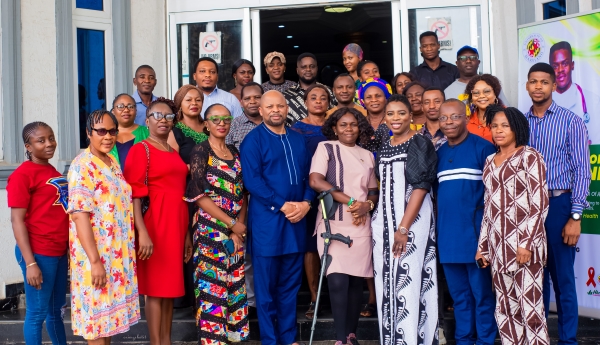From HAPPINESS to BRAVE: Integrating Mental Health Services into HIV Care in Nigeria

Building upon the HAPPINESS Project out of Yale University in Connecticut, which works to increase access to evidence-based treatments for mental, neurological, and substance use disorders in Nigeria, Charlotte Nwogwugwu, DrPH, BSN, RN, HIV PCP, CPH-BC, assistant professor and interim director of the Office of Global Health, has launched The BRAVE Project, Building Resilience and AIDS Care Through Mental Health Valor and Empowerment.
In collaboration with Theddeus Iheanacho, MBBS, DTM&H, associate professor adjunct of psychiatry at Yale, Nwogwugwu is leading the expansion of a University of Maryland, Baltimore 2023 - 24 President’s Global Impact Fund project, which was awarded $150,000 over three years. The BRAVE Project aims to integrate mental health services in HIV care by building the capacity of doctors, nurses, and community health extension workers in HIV clinics in Nigeria’s Imo State to assess, diagnose, treat, and refer patients presenting with mental health conditions. It will also establish a consultation, referral, and supervision framework with mental health specialists that will utilize mobile technology and telehealth for virtual clinical support, supervision, and continuing education. Each participating clinic will have access to at least one supervising psychiatrist/mental health specialist and will hold monthly virtual clinical supervisory meetings and as-needed clinical consultations/referrals. Imo State is one of 36 states in Nigeria, where it is nearly impossible to receive mental health care from a specialist.
 The project uses the World Health Organization’s Mental Health Gap Action Programme-based collaborative model that focuses on shifting tasks within existing clinical infrastructure. The model is designed to enhance the provision of services addressing mental, neurological, and substance use disorders, particularly in countries characterized by low- and middle-income levels. This is achieved by training the HIV clinic providers through five modules:
The project uses the World Health Organization’s Mental Health Gap Action Programme-based collaborative model that focuses on shifting tasks within existing clinical infrastructure. The model is designed to enhance the provision of services addressing mental, neurological, and substance use disorders, particularly in countries characterized by low- and middle-income levels. This is achieved by training the HIV clinic providers through five modules:
- Essential Care and Practice
- Depression
- Psychosis
- Substance Use Disorders
- Suicide Prevention among People Living with HIV/AIDS
The first five-day residential training session of the providers in Nigeria took place Dec. 4 - 9, 2023. The project team will provide a one-day refresher six months after the initial training. The plan is to provide training for two cohorts at different sites per year for three years. Nwogwugwu anticipates this effort will impact 2,000 patients annually. “These numbers are significantly going to increase as we expand the services to additional communities and states,” she says. “We have already started receiving requests from the training participants on the assessment tools, as they have started to assess and see patients following our training.”
 Two students, one from Harvard University in Massachusetts and another from the University of New Haven in Connecticut, have been volunteering on the project since September, conducting qualitative interviews with community members, clinic leaders, and nongovernmental organization leaders.
Two students, one from Harvard University in Massachusetts and another from the University of New Haven in Connecticut, have been volunteering on the project since September, conducting qualitative interviews with community members, clinic leaders, and nongovernmental organization leaders.
“The goal of this project is not only simply to train the workforce but to work collaboratively with practitioners to build an infrastructure that supports the goal of addressing the mental health epidemic by ensuring easier access to care and destigmatizing mental health,” Nwogwugwu says. “We are all one event from a mental health crisis. So, it is important to note that while we empower people to address their mental health needs through bravery, we also infuse the significance of empathy throughout the content of the program.”